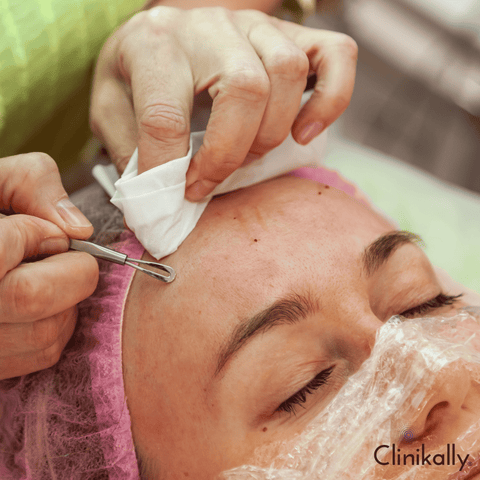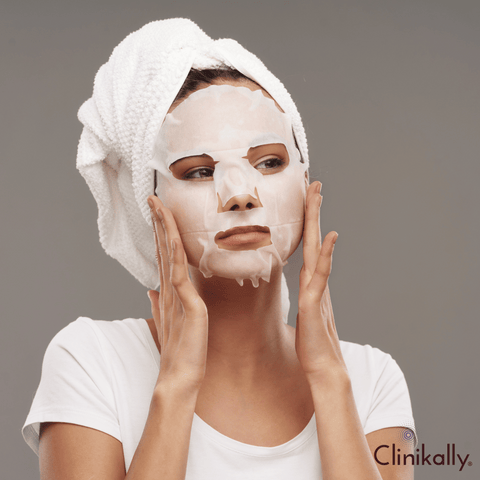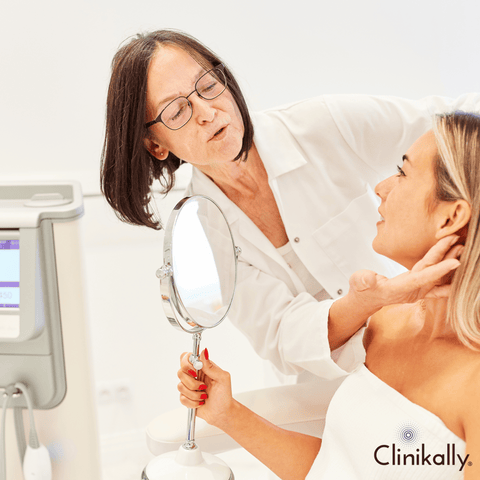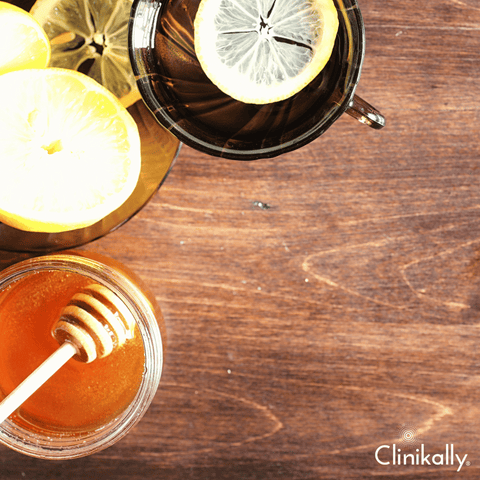A healthy complexion is characterised by naturally glowing skin. Because of lack of sleep, stress, aging, and food, the skin loses its freshness and glow. You can improve the appearance of your skin, but it will take time. Many brides prioritise glowing skin when planning their wedding. This blog will cover professional methods for achieving bright and luminous skin in preparation for the wedding season.
Treatment Finder

You may obtain bright skin for the wedding season by combining skincare treatments and at-home care. Here is a treatment regimen to help you get beautiful skin six months before, three to four months before, two months before, one month before, two weeks before, one week before, and on the wedding day. Consult a skincare expert for personalised advice and product recommendations. Starting your pre-wedding skincare programme several months ahead of time will give you the best chance of having glowing skin on your wedding day.
Skincare routine for the wedding season

A wedding requires a lot of planning and preparation, and one important part is having a radiant and perfect complexion. You must nourish and care for your skin, especially if wedding season is approaching! Most skin specialists feel that everyone, regardless of skin type, should cleanse daily and exfoliate 2-3 times each week. It is also necessary to keep our skin moisturised and protected. Applying moisturiser should not be done on a "once in a while" basis. Dehydrated skin is the source of dullness and wrinkles. Don't wait until your skin feels dry. Simply keep it moisturised. It will be beneficial if you select your moisturiser based on your skin type. Here's a wedding-specific skincare routine to help you achieve beautiful, glowing skin on your big day:
6 Months Before:
-
Consult a Skincare Professional: Make an appointment with a dermatologist or licenced esthetician to assess your skin and develop a customised treatment plan.
-
Customised Products: Begin using professional-recommended products to address your specific skin concerns and goals.
3-4 Months Before:
-
Cleansing: To remove makeup and impurities, use a gentle, sulfate-free cleanser and cleanse your face morning and night.
-
Exfoliation: Exfoliate your skin gently 2-3 times per week to remove dead skin cells and improve texture.
-
Toning: Use a toner to balance the pH of your skin, hydrate it, and prepare it to absorb serums and moisturisers.
-
Serums: Use serums containing ingredients such as vitamin C (for brightness), hyaluronic acid (for hydration), and peptides (for anti-aging).
2 Months Before:
-
Moisturising: Use a hydrating, non-comedogenic moisturiser to keep your skin hydrated and prevent dryness.
-
Sunscreen: Apply a broad-spectrum sunscreen with an SPF of at least 30 every day to protect your skin from UV damage.
1 Month Before:
-
Professional Treatments: If you intend to have professional treatments, such as facials, chemical peels, or microdermabrasion, schedule them at least a month before the wedding to allow for any redness or sensitivity to subside.
-
Finalise Routine: Finish your skincare routine to avoid any last-minute changes that could cause skin irritation.
2 Weeks Before:
-
Diet and Hydration: To support your skin's health, eat a well-balanced diet and drink plenty of water.
-
Stress Management: Use stress-reduction techniques such as meditation and deep breathing exercises to keep your skin calm and glowing.
1 Week Before:
-
Avoid New Products: To reduce the risk of adverse reactions, avoid introducing new skincare products or treatments.
On the Wedding Day:
-
Professional Makeup: Consider hiring a professional makeup artist to enhance your glow with expert techniques and high-quality products.
-
Stay Calm and Enjoy: Keep your cool and concentrate on having fun on your special day. Stress can cause skin problems, so take deep breaths and enjoy the moment.
Skin Assessment

A skin assessment is an examination of the condition, type, and specific problems of your skin. A skincare specialist, such as a dermatologist, licenced esthetician, or skincare therapist, usually performs it. A skin evaluation determines skin type, assesses skin conditions, analyses skin texture, detects skin sensitivities, evaluates UV damage, measures skin moisture, identifies hormonal factors, discusses lifestyle and skincare habits, sets goals, and recommends products and treatments. It guarantees that the products and treatments you use are effective and appropriate for your skin type and problems, assisting you in achieving the best results possible. Consider scheduling a consultation with a skincare specialist for a professional skin assessment if you're confused about your skin type or have specific skin issues.
Effectively tackle skin concerns

Both internal and external factors influence your skin’s glow. Internal factors have more to do with our lifestyle and include diet, sleep, etc. External factors include pollution, sun, weather, etc. Winter is right around the corner, and it does affect your skin, whether you believe it or not. Dry, irritated, flaky, and itchy skin should not become an “every-year” thing. No one likes being uncomfortable in their skin. The skin is likely to lose its natural moisture during the winter season, leaving it dry. The skin should not be left untreated at this time. Keep the skin moisturised properly during the winter. It’s vital to maintaining the skin’s natural glow.
Niacinamide is a multi-tasking and multi-acting skin ingredient that not only hydrates the skin but also treats acne, pigmentation, and much more. Clinikally's Ultimate NIA Serum is the only 10% dermatologist-recommended Niacinamide face serum that you can get delivered for free to your doorstep. To effectively address skin difficulties, you must adopt a focused strategy based on your individual issues. Acne, hyperpigmentation (dark spots), fine lines and wrinkles, dry skin, oily skin, rosacea, sensitive skin, big pores, dull skin, under-eye bags, and dark circles are some common skin concerns and how to handle them. Consider contacting a dermatologist or licenced esthetician for more personalised guidance. They can analyse your skin and prescribe the most effective treatments and products for your unique needs. Maintaining and attaining favorable results in your skincare routine requires consistency.
Get healthy and glowing skin

The winter season is also a wedding season and a time for great aesthetics. During this time of year, everyone wants to shine and look their best. Everyone, not just brides, desires flawless, glowing skin. Rashes, itching, redness, cracks, flaky skin, and other skin problems are common in the winter. Winters can aggravate pre-existing skin conditions such as eczema and psoriasis. Acne, for example, can worsen if you try to treat it at home. Home remedies and skincare routines, no matter how exciting and fun they sound, can aggravate skin problems. Follow a comprehensive skincare programme, live a healthy lifestyle, and seek professional help as needed to attain healthy and beautiful skin. Cleaning, exfoliating, moisturising, sun protection, good food, staying hydrated, stress management, exercise, expert assistance, focused skincare, avoiding harsh substances, night routine, hydrating masks, skin assessment, and consistency. Keep in mind that healthy and beautiful skin is the result of a comprehensive strategy that incorporates a proper skincare routine and a healthy lifestyle. The key is to be patient, as noticeable improvements can take time. If you’re facing any skin problems, it’s best to contact a dermatologist and get them treated. If you’re too lazy to visit a doctor or don’t have the time to, you could do a video consultation from the comfort of your home.
Dermatologist

A dermatologist is a medical specialist who specialises in the diagnosis and treatment of skin, hair, nail, and mucous membrane disorders. Dermatologists have substantial medical training, which includes four years of medical school and at least four years of dermatology residency. They are dermatological experts who can treat a wide range of skin disorders medically, surgically, and cosmetically.
Importance of professional skincare consultations

Professional skincare consultations are useful for a multitude of reasons, as they provide multiple benefits to people who want to enhance their skin health and treat specific difficulties. The following are the main reasons why professional skincare consultations are essential:
-
Personalised Recommendations: Skincare consultations provide personalised advice and product recommendations based on your specific skin type, concerns, and goals. This ensures that you are using products and treatments that are specifically tailored to your needs, maximising their effectiveness.
-
Expert Evaluation: Skincare professionals, such as dermatologists and licenced estheticians, have specialised knowledge and expertise in skin biology, conditions, and the most recent treatment techniques. They can perform a thorough examination of your skin, identifying any underlying issues that may need to be addressed.
-
Advanced Treatments: Skincare experts are able to refer patients to and grant access to cutting-edge treatments that are not sold over the counter. This can include more substantial results from laser treatments, microneedling, medical-grade chemical peels, and more.
-
Safety and Efficacy: Skincare experts can guarantee the safety and efficacy of the treatments and products you use. They can assist you in avoiding procedures or potentially harmful ingredients that might not be appropriate for your skin type.
-
Effective Skin Condition Management: A skincare specialist can offer customised treatments and advice on how to effectively manage specific skin conditions, such as rosacea, eczema, psoriasis, or acne.
-
Skin Cancer Identification: Dermatologists are able to conduct skin examinations and identify early indicators of skin cancer, which may save lives by enabling prompt treatment.
-
Education: Experts in skincare can teach you about your skin, its requirements, and how to take good care of it. This includes daily skincare routines, sun protection, lifestyle factors, and dietary recommendations.
-
Prevention: Skincare consultations can assist you in proactively addressing potential skin issues and preventing them from becoming more serious problems in the future.
-
Product Selection: With so many skincare products on the market, it can be difficult to know which ones are best for your skin. Professionals in skincare can recommend the best products for your specific needs, saving you time and money on trial and error.
-
Follow-up and Progress Monitoring: Following an initial consultation, you can continue to work with a skincare professional to monitor your progress, make necessary adjustments to your routine, and adapt to changing skin conditions over time.
-
Confidence: Professional guidance can provide you with the assurance that you are taking the proper steps to care for your skin and address your concerns.
Top dermatologist-recommended products

Dermatologists frequently recommend a variety of skincare products to address specific skin concerns. Here are some dermatologist-recommended products for everyday skincare:
-
Sunscreen: Sunscreen is a must-have skincare product that dermatologists recommend. Look for broad-spectrum sunscreen with an SPF of 30 or higher. Brands like DERMATICA RAY: Protect Barelyon Fluid Sunscreen SPF 50 and iS Clinical Eclipse SPF 50+ are often recommended.
-
Cleanser: Clinikally Foaming Face Wash and Bioderma Pigmentbio Foaming Cream are gentle options for cleansing sensitive or dry skin.
-
Moisturizer: Clinikally HydraSoothe Moisturiser and Bioderma Atoderm Creme Ultra-Nourishing Creamare popular choices for hydrating and repairing the skin's barrier.
-
Retinoids: Prescription retinoids, such as tretinoin, are frequently prescribed for anti-aging and acne treatments. Over-the-counter retinol products from brands like Clinikally Skin Renewer Retinol Serum and DERMATICA RetiBRIGHT Night Cream are also favored.
-
Antioxidant Serums: Products containing vitamin C are recommended to protect the skin from free radical damage. Clinikally The Ultimate NIA (10% Niacinamide) Serum and Sesderma Azelac RU Liposomal Serum is a well-known antioxidant serum.
-
Hyaluronic Acid Serums: Clinikally Hyaluronic SkinBooster Serum and DERMATICA HA PURE Serum are favorites for adding hydration.
-
Salicylic Acid Products: FCL Alpha Beta Acne Cleanser with salicylic acid is commonly suggested for acne-prone skin.
-
Benzoyl Peroxide Products: Peroclin 2.5% Gel contain benzoyl peroxide and is often recommended for acne.
-
Ceramide-Containing Products: Products with ceramides, such as Oryza Skin Moisturiser, help repair the skin's natural barrier.
-
Physical Sunscreens: For those with sensitive skin, dermatologists may recommend physical sunscreens with zinc oxide or titanium dioxide. Heliocare Advanced Sunscreen Protector Solar Gel SPF 50 is a popular choice.
-
Alpha Hydroxy Acids (AHAs): For exfoliation and improving skin texture, dermatologists may recommend AHA products. Glycolic acid products from brands like Glyco-12 Cream are well-regarded.
-
Niacinamide Products: Niacinamide, or vitamin B3, can help with various skin concerns such as Peltos Niacinamide Sleep Mask.
While these products are highly recommended, it is critical to select products that are appropriate for your skin type and address your specific concerns. A dermatologist can make personalised recommendations based on the needs and goals of your skin. Make sure new products do not irritate your skin by patch-testing them first and incorporating them gradually into your routine.
Pre-wedding skin treatments and procedures

Pre-wedding skin treatments and procedures are popular among brides and grooms-to-be who want to look their best on their wedding day. These treatments can help you look your best by addressing a number of skin issues. The following are some popular pre-wedding skin treatments and procedures:
-
Facials: Facials are an excellent way to rejuvenate your skin before the wedding. Deep cleansing, exfoliation, extractions, and moisturising are all possible. For a fresh, radiant complexion, consider getting a facial a week or two before the wedding.
-
Chemical Peels: Chemical peels exfoliate the top layer of the skin, improving texture and diminishing the appearance of fine lines, wrinkles, and hyperpigmentation. Because there may be some downtime, schedule a chemical peel a few weeks before the wedding.
-
Microdermabrasion: Microdermabrasion uses microscopic crystals to exfoliate the skin, revealing smoother, more luminous skin. It is a light treatment that requires no downtime and can be performed a few days before the wedding.
-
Laser Treatments: Laser therapy can help with a variety of issues, including pigmentation, redness, and fine wrinkles. Fractional laser and intense pulsed light (IPL) are two popular choices. Schedule laser treatments a few weeks before the wedding to allow for any redness or swelling to go away.
-
Botox and Dermal Fillers: Botox can help smooth out fine lines and wrinkles, while dermal fillers can give volume to regions such as the lips and cheeks. These procedures might be performed a few months before the wedding to provide a more natural appearance.
-
Microneedling: Microneedling is the process of inflicting micro-injuries on the skin in order to stimulate collagen formation. It can improve the texture and firmness of the skin. Microneedling sessions should be scheduled a few weeks apart, beginning several months before the wedding.
-
CoolSculpting: CoolSculpting is a non-invasive body shaping treatment. It can help you get the body shape you want by freezing and removing fat cells. Multiple sessions may be required, so plan ahead of time.
-
Hydrafacial: A Hydrafacial is a non-invasive skin care procedure that includes washing, exfoliation, extraction, hydration, and antioxidant protection. It can give your skin a healthy glow and is something you can perform a week or two before the wedding.
-
PRP (Platelet-Rich Plasma) Therapy: PRP therapy is taking your blood, processing it to concentrate platelets, and injecting it into your skin. It can help with skin tone and texture. Begin PRP sessions a few months before the wedding.
-
Topical Skincare: In addition to professional treatments, employing high-quality skincare products containing components such as vitamin C, hyaluronic acid, and retinoids can supplement your skincare routine and improve the health of your skin.
Keep in mind that the timing of these treatments will differ based on the individual, the exact procedure, and the provider's recommendations. It is critical to work with a trained skincare specialist or dermatologist to develop a customised plan that is in line with your goals and wedding date. When scheduling these treatments, always perform a patch test and account for probable downtime or adverse effects.
Addressing specific skin issues before the big day

A focused skincare regimen is required to address specific skin conditions before a significant occasion, such as a wedding. Here are some common skin issues and how to manage them before your wedding:
-
Acne: Consult a dermatologist for tailored treatment options, which may include prescription drugs, topical therapies, and lifestyle changes. To eliminate acne and enhance skin texture, consider a series of professional facials, chemical peels, or light treatments.
-
Hyperpigmentation (Dark Spots): To remove black spots, use skincare products containing components like vitamin C, niacinamide, and alpha hydroxy acids (AHAs). To hasten the removal of pigmentation, schedule expert treatments such as chemical peels or microdermabrasion.
-
Fine Lines and Wrinkles: Incorporate a retinoid product into your skincare regimen to boost collagen formation and decrease the look of fine wrinkles. For immediate wrinkle reduction, consider dermal fillers or Botox treatments.
-
Dry Skin: To fight dryness, use a rich, moisturising moisturiser on a daily basis. To improve skin moisture, schedule a series of hydrating facials or integrate hyaluronic acid serums into your routine.
-
Oily Skin: To control excess oil, use oil-free, non-comedogenic skincare products. To exfoliate and regulate oil production, consider chemical peels or microdermabrasion treatments.
-
Rosacea: To control rosacea flare-ups, consult a dermatologist for prescription treatments and personalised skincare recommendations. Avoid recognised triggers by using a mild, fragrance-free skincare routine.
-
Sensitive Skin: To avoid irritation, choose fragrance-free, hypoallergenic products. Consult a dermatologist for treatment options and advice for sensitive skin.
-
Large Pores: Exfoliation on a regular basis can help minimise the appearance of big pores. Chemical peels and microdermabrasion are professional procedures that can help refine skin texture.
-
Dull Skin: Exfoliate on a regular basis to remove dead skin cells and enhance skin brightness. Consider expert treatments such as chemical peels or microdermabrasion to rejuvenate your skin.
-
Under-Eye Bags and Dark Circles: To minimise puffiness and dark circles, use eye products containing hyaluronic acid and peptides. To avoid under-eye problems, stay hydrated, get enough sleep, and control stress.
Each of these considerations necessitates the development of a skincare plan well in advance of the big day. Begin with a dermatologist or licenced esthetician appointment to examine your skin and obtain personalised recommendations. Consider expert treatments as well as maintaining a consistent skincare routine. Keep in mind that some treatments may take numerous sessions to attain the best results, so plan accordingly.
Daily rituals for radiant skin

Establishing a daily skincare routine and incorporating healthy lifestyle practises are critical for maintaining beautiful and healthy skin. Here are some everyday habits to help you obtain glowing skin:
-
Sunscreen, moisturiser, serum, cleansing, and toning are all part of the morning routine.
-
Hydration, a nutritious diet, and stress management are all important throughout the day.
-
Makeup removal, exfoliation (2-3 times per week), toning, serum, eye cream, and moisturising are all part of my evening routine.
-
Adequate sleep, weekly rituals, a hydrating mask, physical activity, and exfoliation are all part of a healthy bedtime routine.
-
Professional Treatment and Skin Assessment are part of the monthly rituals.
The key to obtaining and keeping glowing skin is consistency. Make sure your skincare routine is matched to your skin type and issues. It's also critical to protect your skin from UV rays, live a healthy lifestyle, and stay hydrated. If you have specific skin concerns, seek personalised advice and treatment recommendations from a dermatologist or licenced esthetician.
The role of diet in achieving glowing skin

Food plays an important role in achieving and maintaining good skin. Foods can influence the health and appearance of your skin by providing essential nutrients, antioxidants, and moisture. The following is how your food impacts your skin:
-
Hydration: Staying hydrated is essential for healthy, bright skin. Drink plenty of water throughout the day to keep your skin moisturised and supple.
-
Antioxidants: Fruits (berries, citrus, and melons), vegetables (carrots, spinach, and sweet potatoes), and green tea are antioxidant-rich foods that can help protect your skin from oxidative stress and free radical damage.
-
Omega-3 Fatty Acids: Omega-3 fatty acids, which can be found in fatty fish (such as salmon and mackerel), flaxseeds, and walnuts, can help reduce inflammation and keep the skin moisturised.
-
Vitamin C: Vitamin C-rich foods, such as citrus fruits, strawberries, and bell peppers, can increase collagen formation and brighten the complexion.
-
Vitamin E: Vitamin E, which may be found in nuts, seeds, and spinach, functions as an antioxidant and helps protect the skin from UV radiation damage.
-
Beta-Carotene: Beta-carotene, found in foods such as carrots, sweet potatoes, and spinach, can provide a healthy glow to your skin by promoting a golden, radiant complexion.
-
Zinc: Zinc, which is found in foods such as lean meats, nuts, and seeds, aids in skin healing and repair.
-
Collagen-Boosting Foods: Collagen is necessary for the suppleness and firmness of the skin. Foods like bone broth, chicken, and fish can help with collagen formation.
-
Probiotics: A healthy gut microbiome can help you achieve clear, glowing skin. To enhance gut health, include probiotic-rich foods like yoghurt, kefir, and kimchi in your diet.
-
Avoid Sugar and Processed Foods: Sugar and processed foods can cause inflammation and breakouts. Reducing your intake of these foods can aid in the maintenance of clear skin.
-
Healthy Fats: Avocado, olive oil, and nuts contain healthy fats that help maintain the moisture and elasticity of the skin.
-
Limit Caffeine and Alcohol Consumption: Excessive caffeine and alcohol consumption can cause dehydration and skin problems. Moderation is essential.
-
Dietary Fibre: Fiber-rich foods such as whole grains, legumes, and fruits promote gut health, which is linked to clear, radiant skin.
-
Collagen Supplements: Some people choose to take collagen supplements, which can help improve skin hydration and elasticity.
-
Allergen Awareness: Be aware of any food allergies or sensitivities, as they can cause skin issues such as hives, eczema, or acne.
-
Balanced Diet: Maintain a balanced diet with a variety of foods, as no single food can provide all of the nutrients your skin requires.
Although a healthy diet is necessary for glowing skin, keep in mind that it is only one part of an all-encompassing skincare regimen. You can achieve and maintain radiant, healthy skin by combining a good diet with sun protection, a skincare regimen, and other lifestyle elements like getting enough sleep and managing your stress. For individualised advice, consider speaking with a dermatologist or registered dietitian if you have any specific questions about your diet or skin.
Best natural ingredients for bridal glow

Natural substances can help you attain a bridal glow by prepping and nurturing your skin. These substances can provide critical nutrition, hydration, and a variety of other advantages. Here are some of the greatest natural elements for glowing bridal skin:
-
Honey: Honey is a natural humectant, which means it aids in the retention of moisture in the skin. It is also antibacterial and antioxidant, making it ideal for blemish-prone skin. It can be used as a mask or as a cleanser.
-
Aloe Vera: Aloe vera is well-known for its moisturising and soothing effects. It has the ability to soothe inflamed skin, reduce redness, and promote healing. Apply pure aloe vera gel or hunt for aloe vera-containing skincare products.
-
Turmeric: Turmeric is anti-inflammatory and anti-oxidant. It can help to brighten and soothe the skin. Use it to make handmade masks, but be careful because it might stain clothing.
-
Rose Water: Rose water is a natural toner that can help balance the pH of your skin while also providing a refreshing boost. It also has anti-inflammatory and antioxidant effects.
-
Coconut Oil: Coconut oil is an excellent natural moisturiser. It can hydrate the skin, remove makeup, and be used as a hair treatment.
-
Cucumber: Cucumber has a cooling and relaxing effect on the skin. When applied to the eyes, it might help to minimise puffiness and dark circles. It can also be used as a component in masks or toners.
-
Papaya: Enzymes in papaya exfoliate the skin, making it smoother and more luminous. It's frequently found in natural exfoliating masks.
-
Green Tea: Green tea is high in antioxidants, which can help protect the skin and prevent inflammation. It's also in a lot of skincare products.
-
Lemon: Lemon contains vitamin C and citric acid, both of which can help brighten the skin. However, while applying lemon to the skin, be cautious because it can be excessively acidic for some people.
-
Oats: Oats are an excellent source of relaxation and exfoliation. Ground oats can be used in masks and scrubs to soothe and soften the skin.
-
Avocado: Avocado is high in healthy fats and vitamin E, making it a nourishing ingredient for dry or mature skin. You can use mashed avocado as a mask.
-
Yoghurt: Yoghurt contains lactic acid, which acts as a natural exfoliant and can help with uneven skin tone and texture.
-
Almond Oil: Rich in vitamin E, almond oil can be used to moisturise and nourish the skin. It is appropriate for dry or sensitive skin.
To be sure you do not experience any negative reactions, always remember to perform a patch test before attempting new natural ingredients. Furthermore, consistency in your skincare routine, as well as lifestyle factors such as hydration, a healthy diet, and stress management, are important in achieving that radiant bridal glow. If you have specific skin concerns, seek personalised advice from a dermatologist or licenced esthetician.
































